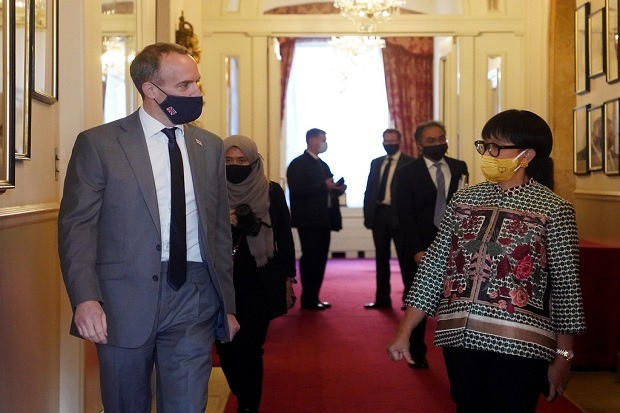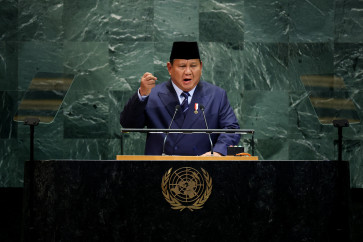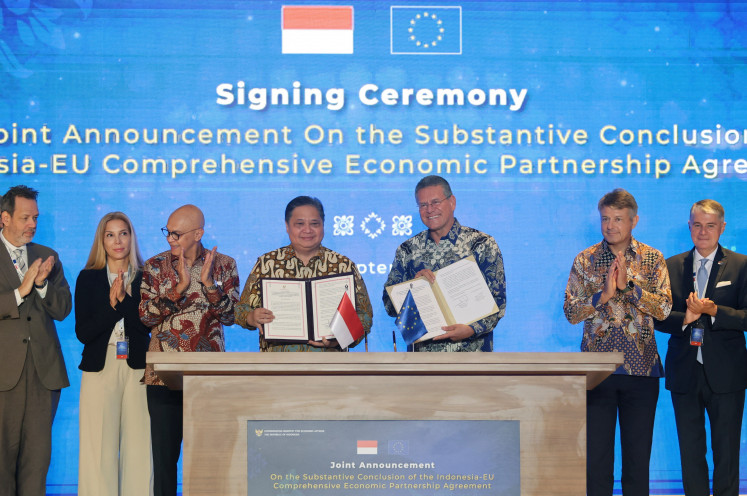Popular Reads
Top Results
Can't find what you're looking for?
View all search resultsPopular Reads
Top Results
Can't find what you're looking for?
View all search resultsUK becomes ASEAN’s newest dialogue partner, ending 25-year moratorium
ASEAN foreign ministers met with United Kingdom Foreign Secretary Dominic Raab virtually on Thursday, where the bloc's current chair and Commonwealth country Brunei announced the new dialogue partnership.
Change text size
Gift Premium Articles
to Anyone
T
he United Kingdom has officially become ASEAN’s 11th dialogue partner, officials announced on Thursday, ending the regional bloc’s 25-year moratorium on awarding third parties its highest institutional partnership status.
ASEAN foreign ministers met with UK Foreign Secretary Dominic Raab virtually on Thursday, in the midst of a British charm offensive in Asia that it unleashed in 2018 as part of its post-Brexit strategy.
The UK officially submitted its application to become an ASEAN dialogue partner in June last year, and since then the country has attended two ministerial meetings with ASEAN, as well as hosting fellow Commonwealth partner Brunei as ASEAN’s chair this year at the G7 Foreign and Development Ministers meeting in May.
Raab touted ASEAN as an influential group of 10 nations in the Indo-Pacific, and the new partnership status would formalize the UK’s relations with the group, giving the UK access to and involvement in annual meetings with foreign ministers of Southeast Asia.
Raab himself has visited the region five times, including to Indonesia in April.
“This is a landmark moment in the UK’s tilt toward the Indo-Pacific. Our closer ties with ASEAN will help create green jobs, reinforce our security cooperation, promote tech and science partnerships, and safeguard key pillars of international law like the United Nations Convention on the Law of the Sea,” Raab said in a statement on Thursday.
Read also: UK hopes to engage more with ASEAN, attend future meetings
The Indo-Pacific region is a strategic reimagining of the Asia-Pacific, which by some accounts takes the focus away from a rapidly developing China and its increasing influence in the region.
Late last month, the UK's carrier strike group, led by the giant new aircraft carrier HMS Queen Elizabeth, entered the South China Sea, prompting a strong response from Beijing, whose claims in the disputed but strategic body of water overlap with that of several Southeast Asian nations.
The Queen Elizabeth has been coordinating exercises with the navies of India, Malaysia and Singapore in recent days, and is due to pay visits to five Japanese ports in September.
With the new ASEAN dialogue partnership status, the UK has also sought to deepen economic links with ASEAN, while maintaining engagement on climate change and the COVID-19 response.
The UK has also pledged a donation of 3.5 million vaccine doses to ASEAN, UK Ambassador to ASEAN Jon Lambe announced.
Read also: Discourse: UK, ASEAN to step up relations: First British envoy to regional bloc
ASEAN has 10 other dialogue partners including Russia, Canada and the European Union, where officials meet regularly in a 10-plus-one format to discuss cooperation over a variety of issues such as economic progress, market access, transfers of technology and development assistance.
Other countries include China, Japan, South Korea – known as the Plus-3 countries – as well as Australia, New Zealand, the United States and India.
UK engagement with ASEAN previously came under the ASEAN-EU partnership, where its efforts were limited by the common policy of the eurozone. After leaving the EU, the UK immediately set out to engage the group on its own terms.
In December last year, the EU upgraded its relationship with ASEAN to a strategic partnership, which enables it an even higher level of engagement with the region’s leaders, as the supranational organization also seeks to temper its influence and up its engagement in the Indo-Pacific.
In a visit to Jakarta in June, the EU’s foreign policy chief Josep Borrell explained that the Indo-Pacific region would be the new “center of gravity” for the 21st century. He went on to say that the EU also sought to have a stronger maritime presence in the South China Sea.










